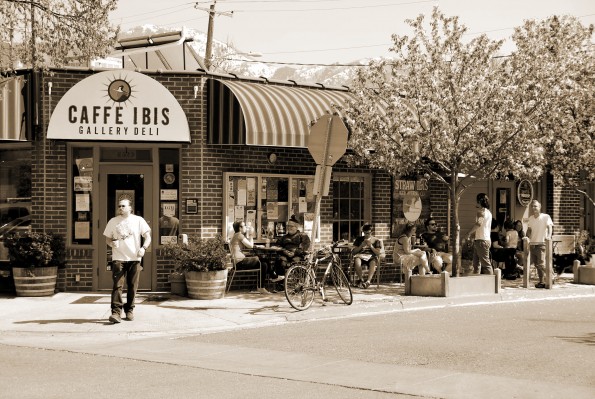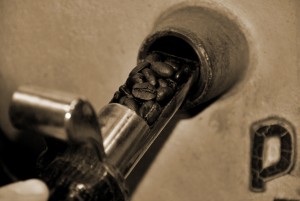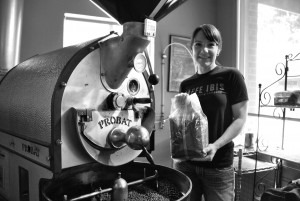 Logan, Utah— It can certainly be said that Cache Valley is a land literally flowing with milk and honey. The white-capped mountain streams feed fresh spring snowmelt to lush green pastures in the Cache Valley. Miles from I-15, this area has remained largely unspoiled by developers and suburban sprawl. Fields of clover and alfalfa make these pastures ideal for dairy cattle. Pollinating the pastures are honey bees from Utah’s largest honey producer– Cox Honey. But besides milk and honey, this place is also home to Utah’s largest coffee roasting operation.
Logan, Utah— It can certainly be said that Cache Valley is a land literally flowing with milk and honey. The white-capped mountain streams feed fresh spring snowmelt to lush green pastures in the Cache Valley. Miles from I-15, this area has remained largely unspoiled by developers and suburban sprawl. Fields of clover and alfalfa make these pastures ideal for dairy cattle. Pollinating the pastures are honey bees from Utah’s largest honey producer– Cox Honey. But besides milk and honey, this place is also home to Utah’s largest coffee roasting operation.
It was the rural environment and the access to the outdoors that attracted Sally Sears from New York and Randy Wirth from Los Altos, California to attend Utah State University in Logan. After marriage and graduation, Sears says, “We couldn’t leave, so then it was just, ‘Okay what are we going to do?’”
They decided to buy a store called the Straw Ibis Grain and Herb Market and try to make a go of an organic foods market. In 1983 there were few people who even knew of the “organic foods movement”, so their shop in the predominently Mormon community was certainly ahead of the times.
But early on Sears and Wirth knew that single-source specialty coffee would become popular. They became one of the early members of the Specialty Coffee Association of America (SCAA) which was based out of Seattle, where Starbucks was and the Stewart Brothers, who started Seattle’s Best Coffee, would eventually drive the growth of the movement.
For the first several years Randy maintained his day job and put money into the business on the side. Then, finding that their coffee was their best selling item, Sears explains, “In 1990 he just said, ‘Let’s just do this full on, let’s just roast our coffee and let’s get it out there.’”
To generate enough income, they segued their business into repairing and selling coffee machines. According to Sears, “It’s good when you are married to a man who can fix anything.” In setting up their own shop it was necessary for them to repair their own equipment, “We are kind of an outpost here.” But in visiting Salt Lake and other Utah cities they found a clientele of entrepreneurs who wanted to start coffee shops, whose machines they could help set up and repair when needed. This is how they first met the owners of the Coffee Garden, Alan and Deter, in Salt Lake City. They helped them set up their coffee machines and business at 9th and 9th.
Besides supplying coffee and machines to Coffee Garden, over the years Caffe Ibis has helped establish over six hundred coffee shops. “We actually stopped counting at 600,” says Sears, “When Randy couldn’t fix a particular machine, he would go to school and learn how from the manufacturer.”
The remoteness of Logan ended up working for their business because Caffe Ibis developed what Sears describes as “a niche within a niche.” Besides setting up their machines and selling other shops coffee. Caffe Ibis coffee is triple certified: organic, fair traded, and Smithsonian-bird friendly.
Today the Caffe Ibis business consists of their production facility in which they roast 350,000 pounds of coffee a year for their accounts all over Utah and their coffee machine repair shop.
Roaster Boyd Anderson, who has been with Caffe Ibis for 24 years, shows me how their 20 kilo roaster operates and how he listens, watches and smells for the perfect time to finish the roast. “Roasting is as much an art as it is a science,” he says. They certainly take their art seriously. Upstairs is a “cupping room” where various beans from various origins are tested to produce the perfect blends of mostly Robusta coffee beans. Their head roaster Brandon Despain recently won the regional roasting competition and will continue to the nationals this year. The other part of the Caffe Ibis business is their coffee shop (which was the former Straw Ibis store), located directly in the center of revitalized downtown Logan.
Caffe Ibis, (the restaurant and coffee shop) rests on 52 Federal Avenue Ave. which has become the social gathering place in town for Utah State students sitting outside enjoying the warm sun while smelling cherry tree blossoms and coffee aromas. Recently a health food store has opened across the street, above it is a large yoga studio. Down the street is a music venue, Why Sound, and a Spirit Goat soap shop. “All of this has just sort of grown out of the years, starting with Caffe Ibis.” says long-time Logan resident and Ibis employee Dee Cudney. Caffe Ibis, “This was the first place in Logan you could get specalty coffee, and it’s really been the driving force behind the revitilization of this area.” Cudney recently moved back to Logan from Salt Lake City after a series of corporate jobs. “I realized this is where I want to be.”

Since the beginning Caffe Ibis has been commited to buying local, buying organic and fair traded coffee. Now that consumer trends are catching up with their vision, they are finding more customers who want to buy their coffee. Caffe Ibis’ largest account today is Harmons Grocery stores, which sells Caffe Ibis in all of their in-store barrista shops as well as all of their grocery stores.
Randy Wirth was tragically killed on his motorcycle by a drunk driver in May 2014. This May there is a bike ride commemorating his legacy with participants cycling around the Cache Valley to several of Randy’s favorite farms and destinations.
Starbucks vs. Coffee Garden
From the onset, The Coffee Garden’s supplier was Seattle’s Best Coffee. But in 2002 Starbucks acquired Seattle’s Best and Starbucks decided they wanted to enter the Salt Lake City market and basically commandeer Salt Lake City’s most popular coffee shop. They offered the Coffee Garden owners $160,000 to go somewhere else.
Coffee Garden passed on the offer. Instead Starbucks opened across the street. Because Coffee Garden no longer wanted to offer the same coffee as Starbucks they decided to change their coffee supplier to Caffe Ibis. “They have been great since day one. Randy and Sally do everything right” said Coffee Garden owner Alan Herbertson. “The Coffee Garden was our first big account.” said Sally. But the competition from the biggest coffee chain in America didn’t end up as a negative, “Starbucks opening across the street for us was the best thing that could have ever happened to us, said Herbertson. “ Our business doubled overnight because everyone wanted to support the local shop and not watch Starbucks put us out of business.” Eventually it was Starbucks who decided to close shop in 9th and 9th.






